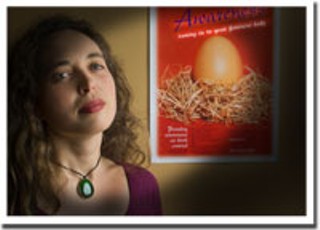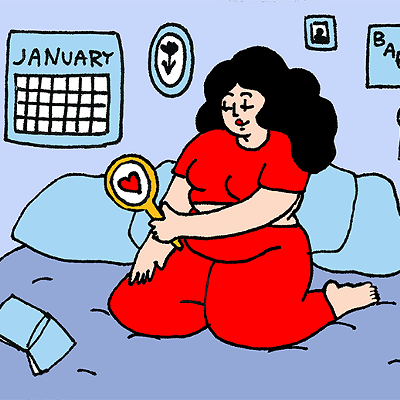On the evening of January 25, 14 women squeezed into the uncomfortably warm waiting room of the Planned Parenthood Metro Clinic on Quinpool. They came to learn a few things about themselves—for instance, where their cervixes are located.
Savayda Jarone’s fertility awareness workshop was filled to capacity, a common occurrence during the two and a half years she’s been conducting them. For women who have a basic understanding of birth control—one confined to pills, injections and barrier methods—the concept of a hormone-free method can be both intriguing and confusing. Jarone, a medical herbalist and fertility awareness educator from Halifax, fielded a dizzying array of questions with ease.
The basics of the method are simple: A woman can only conceive for a few set days during her cycle. Finding those days is where the real work begins. Jarone prepared information packs and sample charts outlining the steps. Women start by taking their temperature each morning and charting it. Add to that regular assessment of cervical fluids, and the optional step of feeling the position of the cervix. From this data, women can determine their most fertile days and abstain from sex during this time. However, because sperm can live inside a woman’s body for up to five days, the duration of abstinence is usually around seven days. The nature of the method varies from woman to woman, so the possible permutations are literally endless.
Putting the method into practice initially can be tricky. “When people are sitting in the workshop and when they leave, there’s definitely that self-trust issue, ‘Can I do this? Am I able to manage my fertility?’” Jarone says. “People are a little uncertain until they actually start to practice it. That’s why women and couples need a couple good cycles to really feel comfortable with the method.”
Misconceptions (some lump the fertility awareness method in with the “rhythm method”) and lack of formal education about the method result in many women being uninformed, or at least unsure, about their own ability to work with their natural cycles to prevent or encourage childbirth.
“I think unfortunately the medical profession in general has been caught up in the whole concept of convenience and doubt women’s abilities to look after themselves. The general assumption was made that women either can’t or don’t want to be burdened with their fertility,” Jarone says. Her next workshop is March 29, location TBA. She’d also like to take education about the method into schools, to give young women the choice to forgo the seemingly compulsory hormonal roller coaster that can result from taking other forms of birth control.
Jarone also mentions that more young women are attending her workshops than ever before, something she attributes to the backlash against chemicals. “As natural and alternative health becomes more popular, women are beginning to think a little more about managing their own health and about what they’re putting into their body,” she says. “That motivation may have been there at an early age and I get a lot of young women at the clinic who are actually starting off with birth control and this is their first choice.”
The method may not be for everyone, and works best for people who take it seriously and are well organized. For some women it simply isn’t possible at all. For instance, take the unfortunate example of one woman in the workshop who found it impossible to get the requisite three uninterrupted hours of sleep in a row per night before taking her temperature in the morning.
For those who are able to participate, the success rate for the method is comparable to hormonal birth control options. As with using the pill, the effectiveness depends on how diligent you are in following it. Bearing this is mind, for the price of a good quality thermometer and a healthy dose of patience, satisfaction can be achieved
“This knowledge will follow a woman though her lifetime, so she can’t expect it of herself to be a pro . It’s a little more complicated then popping a pill,” Jarone says. “The feedback I get from the follow-ups with women is that they are really happy and their lives have really changed.”
For more information on the next fertility awareness workshop, contact Jarone at 454-8481.













